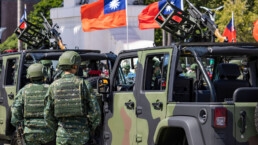Biden officials insist there have been no changes to its policy with respect to Beijing and Taiwan, but its words and actions say otherwise.
by Daniel Larison, Responsible Statecraft
The United States is reportedly planning to increase its military presence in Taiwan from nearly 40 to between 100 and 200 military personnel.
According to the first report by The Wall Street Journal last week, the additional troops will arrive in the coming months. The small number of U.S. forces in Taiwan has been growing steadily in recent years from less than two dozen at the start of 2021 to what could be nearly ten times as many by the middle of this year. News of the larger troop presence came on the heels of a high-level meeting between U.S. and Taiwanese officials in Washington last Tuesday. There are also separate reports that 500 Taiwanese troops will be sent to the United States for combat training.

While the total numbers involved are still small, these moves represent significant increases in cooperation between the two governments and could portend larger deployments in the future. As the Journal article states, the planned increase would be “the largest deployment of forces in decades by the U.S. on Taiwan.” The United States and Taiwan have had some military cooperation and unofficial ties despite the lack of formal relations between the two, but the difference now is that these ties are becoming stronger and more visible at the same time and therefore harder for the Chinese government to ignore.
The article suggested that the administration had been trying to keep the larger troop presence out of the public eye. According to the report, the training program is one that “the Pentagon has taken pains not to publicize,” but the public also has a right to know about decisions that the government is making that increase the direct U.S. commitment to Taiwan. If the Washington is going to deploy more troops to Taiwan than it has in decades, the public should be aware of it and Congress should be asking pointed questions about the potential implications of these decisions.
Recent Posts
‘Unconstitutional. Unethical. Authoritarian.’ ICE Bars Millions Of Immigrants From Bond Hearings
July 18, 2025
Take Action Now One watchdog said the new policy “seems like a blatant attempt to stop them from exercising their right to due process.”……
Americans Are Not Nearly Alarmed Enough About Climate Change
July 18, 2025
Take Action Now Americans still don’t comprehend how imminent, dangerous, and far-reaching the threat is—and journalists are partly to blame.By…
The IRS Is Building A Vast System To Share Millions Of Taxpayers’ Data With ICE
July 17, 2025
Take Action Now ProPublica has obtained the blueprint for the Trump administration’s unprecedented plan to turn over IRS records to Homeland Security…
Israel’s Sudden Assault On Syria Is Unchecked Aggression
July 17, 2025
Take Action Now Jerusalem is bombing Damascus and threatening al-Sharaa’s rule, while Washington was hoping to help the nascent government on…




